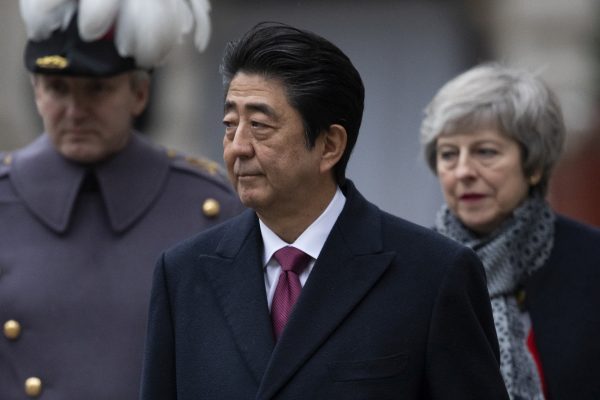Diplomacy is particularly important to Abe because of its utility in promoting his domestic political standing. The Prime Minister has reiterated his ambition to promote ‘the final settlement of Japan’s post-war diplomacy’. Topping the ‘settlement’ list is resolving the so-called ‘Northern Territories’ (Southern Kurils) issue with Russia and signing a peace treaty.
But serious obstacles remain. If Russia behaves true to form, Abe’s vision will remain based more on wishful thinking than on realistic prospects for regaining what Japan regards as its lost territory. So far, rebuilding the bilateral relationship through economic cooperation in the Northern Territories has mostly involved ‘give’ on Japan’s part and ‘take’ on Russia’s part.
Abe is also breaking with Japan’s long-standing position on the return of the Northern Territories by revealing that he would be happy with a return of just the Shikotan and Habomai islands (the so-called ‘1956 model’). Japan claims these islands are not part of the Southern Kurils but part of Hokkaido Prefecture, unlike the other two islands Etorofu and Kunashiri.
But in advance of direct Abe–Putin talks on the issue that will begin on 21 January 2018 with Abe’s trip to Moscow, Russian actions suggest Putin’s plan is to sabotage the talks even before they have begun. Moscow is asking Japan first to recognise Russian sovereignty over all the islands, objecting to Japan calling them the Northern Territories, mobilising domestic opposition to any handover and criticising Japan’s deployment of an on-shore missile defence system on its own territory.
Russia is also expressing concern about possible basing of US troops on the islands despite an explicit US military denial of any such plan. Meanwhile Russia itself is increasingly militarising the islands by stationing even greater numbers of troops on Kunashiri and Etorofu and encouraging Russian settlers to take up residence there.
The other important issue to be settled is the abduction of Japanese nationals by North Korea. This is even less likely to be resolved than in previous years given the breakdown in official negotiations and agreements between the two countries. Recent North Korean denials of the existence of abduction victims, Kim Jong-un’s lack of interest in pursuing the matter or meeting directly with Abe and North Korea’s bandwagoning on South Korea in relation to the requisitioned worker dispute do not bode well for Abe’s diplomatic agenda.
Despite acknowledging the imperative of North Korean denuclearisation, the Abe administration and its preoccupation with the abduction issue are also being completely sidelined by the theatrics of the Trump–Kim summits.
Still, Abe is hoping that diplomatic achievements will ease his domestic political path through 2019. This makes the continuing ‘history war’ and current diplomatic stoush with South Korea an unwelcome distraction. As former South Korean ambassador for international security affairs Chung Min Lee and others rightly argue, the deterioration in South Korea–Japan ties is undermining the potential for broader trilateral security relations between Japan, South Korea and the United States.
When combined with increasing North–South rapprochement, growing anti-Japanese sentiment in South Korea and the prospect of another over-hyped Trump–Kim agreement on North Korean denuclearisation, the descent into ‘tension-fuelled dysfunctionality’ in Japan’s relations with South Korea only exposes Japan to an even greater threat from North Korean nuclear and ballistic missiles.
Highest on Abe’s domestic policy agenda is constitutional reform, an issue hostage to domestic politics and ruling Liberal Democratic Party (LDP)–Komeito coalition numbers in both houses of the National Diet. Proposing a constitutional amendment requires two-thirds majorities in both houses, numbers that the coalition currently has.
But the fate of constitutional reform is difficult to call in 2019 because of scheduled elections. This includes nationwide local government elections in April and the expected Upper House election in July — a dual political showdown that only happens once every dozen years.
Key to the latter will be the ability of opposition parties to coordinate with each other to field joint candidates in the 32 constituencies where only a single seat is up for grabs, a strategy that they recognise as an absolute imperative. The main opposition parties believe doing so not only holds the key to the election outcome but also to their ability to thwart Abe’s agenda. Given Komeito’s predilection to prioritise power over principle, it will only serve as a weak brake on this agenda.
As in the past, Abe may resort to his familiar tactic of creating momentum for an LDP victory and a resounding endorsement of his government — as well as raising the bar for opposition party collaboration — by calling a double election.
In contrast to previous elections when Abe has remained quiet on the topic of constitutional reform in the campaign for fear of a negative impact on the LDP’s performance, this time it will be a prominent election issue whether he actively promotes it or not. This is a direct consequence of his constitutional reform timetable and the importance of the government’s seat numbers in the Upper House to achieving constitutional reform. This is yet another reason for the Prime Minister to generate greater momentum for his agenda by dissolving the Lower House and holding simultaneous elections, particularly if he is successful on the diplomatic front.
Aurelia George Mulgan is Professor in the School of Humanities and Social Sciences at the University of New South Wales, Canberra.


Japan’s opposition parties have proven remarkably inept at convincing voters to support them even in the face of Abe’s failed domestic economic and social programs. Unfortunately, there is little reason to believe they will advance their cause by pointing out his lack of success with Russia and N Korea. Both Putin and Kim are holding almost all the leverage in their so called negotiations. Likewise there is little Abe can do to motivate Moon of S Korea to alter the dynamics of the labor and comfort women disputes.
As an outsider it seems sad to me that the Japanese voter has had very limited options for many years now.